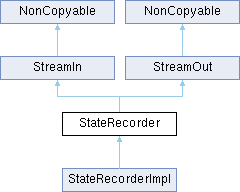|
| | StateRecorder ()=default |
| | Constructor.
|
| |
| | StateRecorder (const StateRecorder &inRHS) |
| |
| void | SetValidating (bool inValidating) |
| |
| bool | IsValidating () const |
| |
| void | SetIsLastPart (bool inIsLastPart) |
| |
| bool | IsLastPart () const |
| |
| virtual | ~StreamIn ()=default |
| | Virtual destructor.
|
| |
| virtual void | ReadBytes (void *outData, size_t inNumBytes)=0 |
| | Read a string of bytes from the binary stream.
|
| |
| virtual bool | IsEOF () const =0 |
| |
| virtual bool | IsFailed () const =0 |
| | Returns true if there was an IO failure.
|
| |
| template<class T , std::enable_if_t< std::is_trivially_copyable_v< T >, bool > = true> |
| void | Read (T &outT) |
| | Read a primitive (e.g. float, int, etc.) from the binary stream.
|
| |
| template<class T , class A , std::enable_if_t< std::is_trivially_copyable_v< T >, bool > = true> |
| void | Read (Array< T, A > &outT) |
| | Read a vector of primitives from the binary stream.
|
| |
| template<class Type , class Traits , class Allocator > |
| void | Read (std::basic_string< Type, Traits, Allocator > &outString) |
| | Read a string from the binary stream (reads the number of characters and then the characters)
|
| |
| template<class T , class A , typename F > |
| void | Read (Array< T, A > &outT, const F &inReadElement) |
| | Read a vector of primitives from the binary stream using a custom function to read the elements.
|
| |
| void | Read (Vec3 &outVec) |
| | Read a Vec3 (don't read W)
|
| |
| void | Read (DVec3 &outVec) |
| | Read a DVec3 (don't read W)
|
| |
| void | Read (DMat44 &outVec) |
| | Read a DMat44 (don't read W component of translation)
|
| |
| | NonCopyable ()=default |
| |
| | NonCopyable (const NonCopyable &)=delete |
| |
| void | operator= (const NonCopyable &)=delete |
| |
| virtual | ~StreamOut ()=default |
| | Virtual destructor.
|
| |
| virtual void | WriteBytes (const void *inData, size_t inNumBytes)=0 |
| | Write a string of bytes to the binary stream.
|
| |
| virtual bool | IsFailed () const =0 |
| | Returns true if there was an IO failure.
|
| |
| template<class T , std::enable_if_t< std::is_trivially_copyable_v< T >, bool > = true> |
| void | Write (const T &inT) |
| | Write a primitive (e.g. float, int, etc.) to the binary stream.
|
| |
| template<class T , class A , std::enable_if_t< std::is_trivially_copyable_v< T >, bool > = true> |
| void | Write (const Array< T, A > &inT) |
| | Write a vector of primitives to the binary stream.
|
| |
| template<class Type , class Traits , class Allocator > |
| void | Write (const std::basic_string< Type, Traits, Allocator > &inString) |
| | Write a string to the binary stream (writes the number of characters and then the characters)
|
| |
| template<class T , class A , typename F > |
| void | Write (const Array< T, A > &inT, const F &inWriteElement) |
| | Write a vector of primitives to the binary stream using a custom write function.
|
| |
| void | Write (const Vec3 &inVec) |
| | Write a Vec3 (don't write W)
|
| |
| void | Write (const DVec3 &inVec) |
| | Write a DVec3 (don't write W)
|
| |
| void | Write (const DMat44 &inVec) |
| | Write a DMat44 (don't write W component of translation)
|
| |
Class that records the state of a physics system. Can be used to check if the simulation is deterministic by putting the recorder in validation mode. Can be used to restore the state to an earlier point in time. Note that only the state that is modified by the simulation is saved, configuration settings like body friction or restitution, motion quality etc. are not saved and need to be saved by the user if desired.



 Public Member Functions inherited from StreamIn
Public Member Functions inherited from StreamIn Public Member Functions inherited from NonCopyable
Public Member Functions inherited from NonCopyable Public Member Functions inherited from StreamOut
Public Member Functions inherited from StreamOut